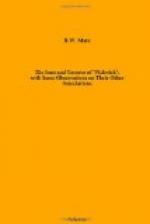There is an interesting Visitors’ Book in the Pickwick Room, wherein guests are asked to inscribe their names and designations; also a private or business motto. Custom has it that a man only signs the book once, however many times he may visit the Pickwick Room, unless his official position has altered through business promotion.
This being the floor tradition has decided was Mr. Pickwick’s bedroom, it is suitably decorated with Pickwickian and Dickensian pictures and ornaments, all tending to remind the visitor of the homely period of the past. There are no bedrooms to-day in the inn, nor are there any comfortable so-called sitting- or coffee-rooms, for all the available space is required for satisfying the hungry city man.
The history of the “George and Vulture” goes back some centuries. Originally it was the London lodging of Earl Ferrers, and in 1175 a brother of his was slain there in the night. It was then called simply the “George,” and described by Stow, the great historian of London, as “a common hostelry for travellers.”
[illustration: The “George and Vulture.” Drawn by L. Walker]
Ultimately the “Vulture,” for reasons undiscovered by the present writer, was added to the sign, and the appellation the “George and Vulture” has come through the history of London unaltered, gathering with the flight of time many famous associations to keep its memory green in each succeeding period, until Mr. Pickwick put the coping-stone to its fame as one of London’s imperishable heritages.
Poets and literary men of all degrees frequented it
from the earliest times, and although there is no
record available to substantiate a claim that the
great Chaucer used the house, it seems possible that
his father, who was himself a licensed victualler
in the district, knew it well. But John Skelton,
the satirical poet of the fifteenth century, undoubtedly
enjoyed its hospitality, for he has left record in
the following lines that he was acquainted with it:
Intent
on. signs, the prying eye,
The
George & Vulture will descry.
Let
none the outward Vulture fear,
No
Vulture host inhabits here.
If
too well used you deem ye then
Take
your revenge and come agen.
Taverns in those days were the resort of most of the prominent men of the day, and were used in the same manner by them as the clubs of the present time, as a friendly meeting place for business men, authors, artists, lawyers, doctors, actors and the fashionable persons of leisured ease with no particular calling, all of whom treated “mine host” as an equal and not as a servant.
And so we find that men like Addison and Steele were much in evidence at these friendly gatherings of their day; that Jonathan Swift and his coteric foregathered in some cosy corner to discuss the pros and cons of that great fraud, the South Sea Bubble; that Daniel Defoe was a constant guest of the host of his time; that John Wilkes and his fellow-members of “The Hell Fire Club” used the house for their meetings, and many others the recital of whose names would resolve into a mere catalogue.




